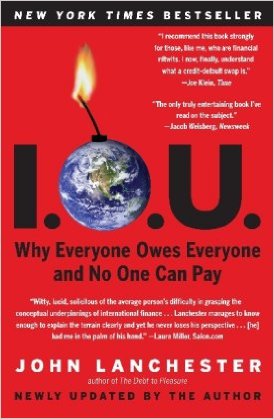The reputation of the financial industry took a big hit following the 2008 financial collapse. Global banks have been accused of money laundering, LIBOR fixing and commodity price manipulation. And meanwhile, regulators have been unable to enforce legislation to curtail this ‘banking culture’. John Lanchester, the author of “ I.O.U.: Why Everyone Owes Everyone and No One Can Pay”, expresses frustration that very little has been done to fix the financial system and unfortunately it will have to wait for another crisis.
This is another book on the ’08 financial crisis. However, it is a useful introduction to concepts like leverage, Credit Default Swaps (CDS) and Value at Risk (VAR) for a newcomer to finance. Lanchester looks for scapegoats for the crisis and finds many. The bankers expanded their balance sheets with abandon. They cared little about borrower’s ability to pay as the risk was offloaded to someone else. The flawed VAR models described the asset price declines as ‘multiple sigma events’ or rare, when they have happened repeatedly in the past. The rating agencies assigned their highest ratings to 90% of the mortgage backed Collaterized Debt Obligations (CDO) when only a handful of corporates are rated that highly. Central bankers kept rates low and assumed that the buyers of financial products understood the risks they were taking. The regulators were lax in monitoring a foreign bank’s subsidiary or a non-bank, assuming that their home regulators were vigilant. Economists did not highlight the trouble that was brewing either. All of these factors combined to cause a massive collapse of the financial system.
There is plenty of anger in the book. The author cites the example of airlines, drug companies and supermarkets who have all internalized the need for safety. They are not necessarily ethical but they get it. Accidents can put them out of business. When will our banks realize this? The crisis has worked fine for them thus far with taxpayers footing the bill and bankers’ bonuses back on track.
But, despite the arguments of “IOU: Why Everyone Owes Everyone and No One Can Pay”, perhaps we shouldn’t be too pessimistic about who is footing the bill. For example, JP Morgan Chase ended up making a $13 billion settlement with regulators for mis-selling mortgage backed securities during the ’08 crisis. Can criminal prosecution be far behind?


